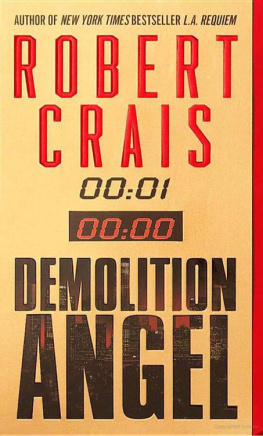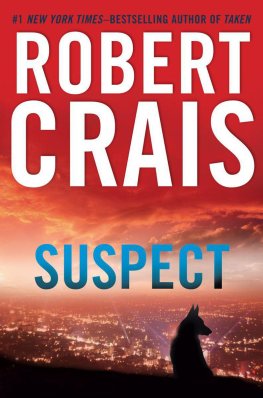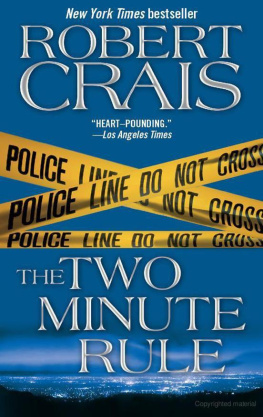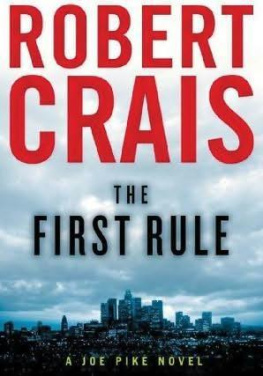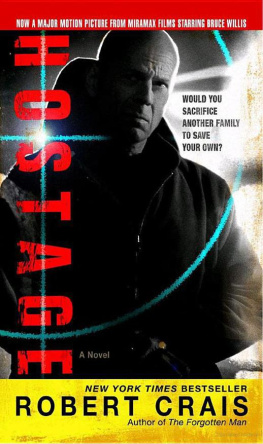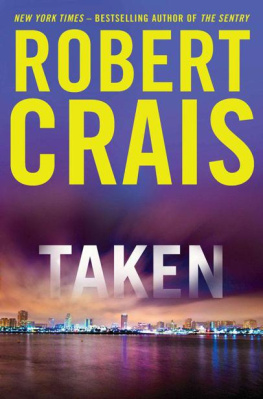Robert Crais - The Last Detective
Here you can read online Robert Crais - The Last Detective full text of the book (entire story) in english for free. Download pdf and epub, get meaning, cover and reviews about this ebook. year: 2003, publisher: Doubleday, genre: Detective and thriller. Description of the work, (preface) as well as reviews are available. Best literature library LitArk.com created for fans of good reading and offers a wide selection of genres:
Romance novel
Science fiction
Adventure
Detective
Science
History
Home and family
Prose
Art
Politics
Computer
Non-fiction
Religion
Business
Children
Humor
Choose a favorite category and find really read worthwhile books. Enjoy immersion in the world of imagination, feel the emotions of the characters or learn something new for yourself, make an fascinating discovery.

- Book:The Last Detective
- Author:
- Publisher:Doubleday
- Genre:
- Year:2003
- Rating:4 / 5
- Favourites:Add to favourites
- Your mark:
- 80
- 1
- 2
- 3
- 4
- 5
The Last Detective: summary, description and annotation
We offer to read an annotation, description, summary or preface (depends on what the author of the book "The Last Detective" wrote himself). If you haven't found the necessary information about the book — write in the comments, we will try to find it.
The Last Detective — read online for free the complete book (whole text) full work
Below is the text of the book, divided by pages. System saving the place of the last page read, allows you to conveniently read the book "The Last Detective" online for free, without having to search again every time where you left off. Put a bookmark, and you can go to the page where you finished reading at any time.
Font size:
Interval:
Bookmark:
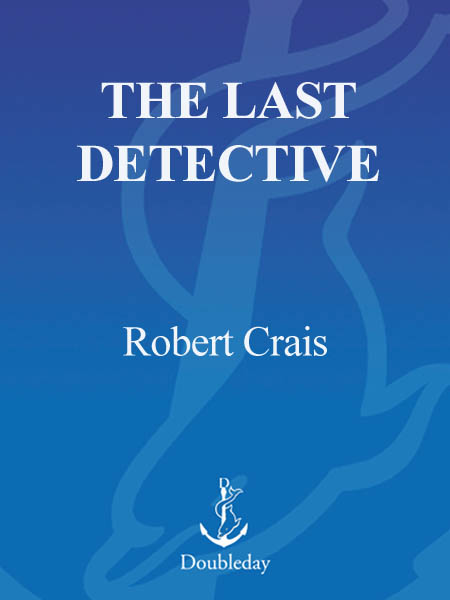
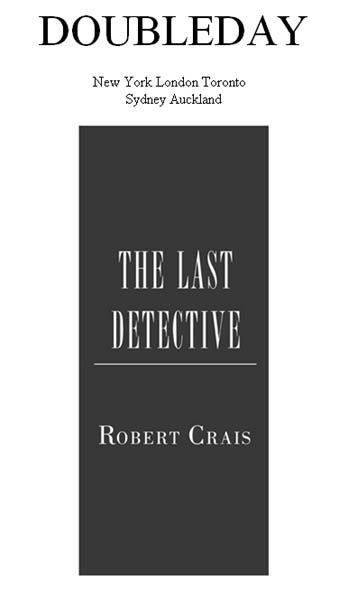
Contents
for Wayne Warga
who maintained his post under
intense enemy fire and did not waver
even as he was overrun.
Acknowledgments
The author would like to thank the following people for their contributions:
Eli and Tara Lucas, masters of Emydon out of Petersburg, Alaska, provided information about commercial fishing and the Alaskan brown bear; more important, they allowed me to share in the richness of their lives.
Kregg P.J. Jorgenson and Kenn Miller provided insight and detail about U.S. Army Rangers, Ranger operations, and LRRP (lurp) missions conducted during the Vietnam war. Gary Linderer provided additional information. The liberties taken with reality (i.e., use of the term hoo) are my responsibility, as are all errors of fact.
Randy Sherman, MD, Professor and Chief of the Division of Plastic and Reconstructive Surgery at the USC School of Medicine, provided information, illustrations, and early-morning counsel on wounds, wound trauma, and recovery; Joe Pike could not have a finer surgeon.
Elyse Dinh-McCrillis provided Vietnamese translations.
Detective-3 John Petievich, LAPD-retired, opened doors to Missing Persons operations within the Los Angeles Police Department.
Additional thanks go to Aaron Priest. Jason Kaufman, Steve Rubin, and Gina Centrello made it better, and demonstrated patience beyond any that could reasonably be expected. Thank you.
The Church of Pike
Angoon, Alaska
T he cold Alaskan water pulled at the fishing boats that lined the dock, the boats straining against their moorings to run free with the tide. The water here in the small harbor at Angoon, a fishing village on the western shore of Admiralty Island off southeast Alaska, was steel-black beneath the clouds and dimpled by rain, but was clear even with that, a window beneath the weathered pilings to a world of sunburst starfish as wide as garbage cans, jellyfish the size of basketballs, and barnacles as heavy as a longshoreman's fist. Alaska was like that, so vigorous with life that it could fill a man and lift him and maybe even bring him back from the dead.
A Tlingit Indian named Elliot MacArthur watched as Joe Pike stowed his duffel in a fourteen-foot fiberglass skiff. Pike had rented the skiff from MacArthur, who now nervously toed Pike's rifle case.
You didn't tell me you were goin' after those bears up there. It ain't so smart goin' in those woods by yourself. I don't wanna lose my boat.
Pike secured his duffel between the skiff's bench seats, then took hold of the gun case. Pike's weapon of choice that day was a stainless-steel Remington Model 700 chambered in .375 Holland & Holland Magnum. It was a powerful gun, built heavy to dampen the .375's hard recoil. Pike lifted the case with his bad arm, but the arm failed with a sharp pain that left his shoulder burning. He shifted its weight to his good arm.
MacArthur didn't like this business with the arm.
Now you listen. Goin' after that bear with a bad arm ain't the brightest idea, either. You're gonna have my boat, and you're gonna be alone, and that's a big bear up there. Has to be big, what he did to those people.
Pike strapped the rifle case across the duffel, then checked the fuel. It was going to be a long trip, getting from Angoon up to Chaik Bay where the killings had taken place.
You better be thinkin' about this. Don't matter what kinda bounty the families put up, it ain't worth gettin' killed for.
I won't lose your boat.
MacArthur wasn't sure if Pike had insulted him or not.
Pike finished with his gear, then stepped back onto the dock. He took ten one-hundred-dollar bills from his wallet and held out the money.
Here. Now you won't have to worry about it.
MacArthur looked embarrassed and put his hands in his pocket.
Let's just forget it. You rented it, it's yours. You're makin' me feel like a miser and I don't appreciate that.
Pike put the money away and stepped down into the skiff, keeping his weight low. He cast off the lines.
You bank the boat when you get up Chaik, use that orange tape to flag a tree so I can find ya if I have to come looking.
Pike nodded.
Anyone you want me to call, you know, if you need me to call someone?
No.
You sure?
Pike nosed away from the dock without answering and set off for deeper water, holding his bad arm close.
The light rain became fat drops, then a low foggy mist. Pike zipped his parka. A family of seals watched him pass from their perch on a promontory of rocks. Humpback whales spouted further out in the channel, one great tail tipping into the sky as a whale sounded, Pike's only thought to wonder at the perfect quiet that waited in the waters below.
Pike rubbed his bad shoulder. He had been shot twice high in the back almost eight months ago. The bullets shattered his shoulder blade, spraying bone fragments like shrapnel through his left lung and the surrounding muscles and nerves. Pike had almost died, but didn't, and had come north to heal. He worked king crab boats out of Dutch Harbor and fishing boats out of Petersburg. He long-lined for black cod and halibut, and if the crews on the boats he worked saw the scars that laced his chest and back, no one asked of their nature. That was Alaska, too.
Pike steered north for four hours at a steady six knots until he reached a circular bay with two small islands at its mouth. Pike checked his chart, then double-checked his position on a handheld GPS. This was the place, all right. Chaik Bay.
The pounding chop of the channel gave way to water as flat as glass, undisturbed except for the head of a single white seal. The bottom rose as Pike eased toward shore, and soon the first of the carcasses appeared; dead salmon as long as a man's arm drifted with the current as they washed out of the creek, their bodies mottled and broken with the effort to spawn. Hundreds of seagulls picked through the fish that had washed onto shore; scores of bald eagles perched in the treetops, a single eagle at the peak of each tree, watching the gulls with envious eyes. The smell of rotten fish grew sharp.
Pike shut the engine, let the skiff glide into the rocky beach, then stepped out into ankle-deep water. He pulled the boat high above the tide line, then tied it to a hemlock limb. He flagged the limb with orange tape as Elliot MacArthur had asked.
Alder, spruce, and hemlock trees lined the shore like an impenetrable green wall. Pike made camp beneath the soft boughs, then ate a supper of peanut butter and carrot sticks. Later, he smoothed a place on the beach where he stretched until his muscles were warm, then did push-ups and sit-ups on pebbles that clawed at his flesh. He worked hard. His spine arched and his legs lifted in the most strenuous asanas of hatha yoga. He spun through the strict choreography of a tae kwon do kata, kicking and windmilling his arms as he blended the Korean form into the Chinese forms of kung fu and wing chun in a regimen he had practiced every day since he was a child. Sweat leaked from his short brown hair. His hands and feet snapped with a violence that frightened the eagles. Pike pushed himself faster, spinning and twisting through the air, falling within himself in a frenzy of effort as he tried to outrace his pain.
It was not good enough. His shoulder was slow. His movements were awkward. He was less than he had been.
Pike sat at the water's edge with a sense of emptiness. He told himself that he would work harder, that he would heal the damage that had been done, and recreate himself as he had recreated himself when he was a child. Effort was prayer; commitment was faith; trust in himself his only creed. Pike had learned these catechisms when he was a child. He had nothing else.
Next pageFont size:
Interval:
Bookmark:
Similar books «The Last Detective»
Look at similar books to The Last Detective. We have selected literature similar in name and meaning in the hope of providing readers with more options to find new, interesting, not yet read works.
Discussion, reviews of the book The Last Detective and just readers' own opinions. Leave your comments, write what you think about the work, its meaning or the main characters. Specify what exactly you liked and what you didn't like, and why you think so.

